Fresh from the Farm
Full of Flavor

Tasting the difference with pasture-raised beef and fresh eggs—naturally nutrient-rich and delivered at peak freshness from Sample Farm
If you’re not a vegetarian, you probably enjoy a good steak.
But not every steak is the same.
“I can look at any steak and tell you what kind of pasture that steak was raised on, (based on) the color content of the fat,” said Scott Sample. “Take a New York strip. It has a fat cap on top of it. The animals we’re producing right now, that fat has an orange, kind of yellowish hue to it.”
Sample says that’s the sign of a steak that is likely healthier for you and better tasting.
“There’s current research coming out about grass-fed, low-stress environments versus feed-lot beef. It’s more nutrient-dense beef, so it’s better health-wise for the consumer.”
Sample should know of what he speaks.
He owns Sample Farm, 3,800 acres of land just south of the Caddo Parish line. Starting early and ending late, Sample spends his days farming 250 of those acres.
“We’re a local farm focusing on local food production that services our local community in the greater Shreveport area. We started off raising beef, pork, eggs and chicken, and have narrowed that down to beef and eggs.”
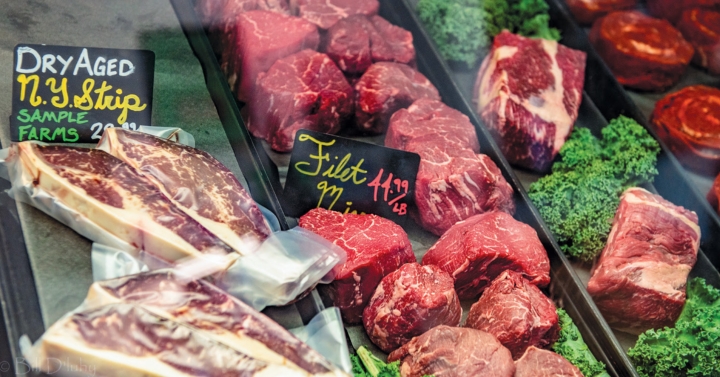
Sample Farm manipulates the cycles of nature to produce better-tasting beef.
What makes Sample Farm different from most cattle-raising farms is that it is a regenerative farm. Regenerative farming is a farming philosophy that Sample learned from his college professors.
“A regenerative farm takes a holistic view to the way we farm. We view our farm as an ecosystem. We’re heavy management-intensive. We move our cattle almost daily for the sake of soil health — and ecosystem health. We put all the focus on the health of the animal. We try not to use pharmaceuticals on our cattle. Our cattle are in a low-stress environment. We like to say they only have one bad day in their whole life. I think that translates to a better-quality product.”
Every 24 hours, Monday-Friday, Sample moves a herd of 60-80 cattle from one acre or acre-and-a-half of land to another. This time of year, it’s about 30 days before the cattle return to that same area.
“In the summertime when soils are stressed and the grasses are stressed, we give about a 45- to 50-day rest cycle. We’re constantly trying to figure out the caring capacity of our farm. How many animals can our farm handle without overgrazing? But we want to maximize that number because we don’t want to undergraze. It’s a constant ebb and flow with the seasons.”
Once the animals leave a particular area, the rebuilding of that area begins.
“It’s the disturbance that the cattle put on the ground that enhances the succession and the new growth that we want.
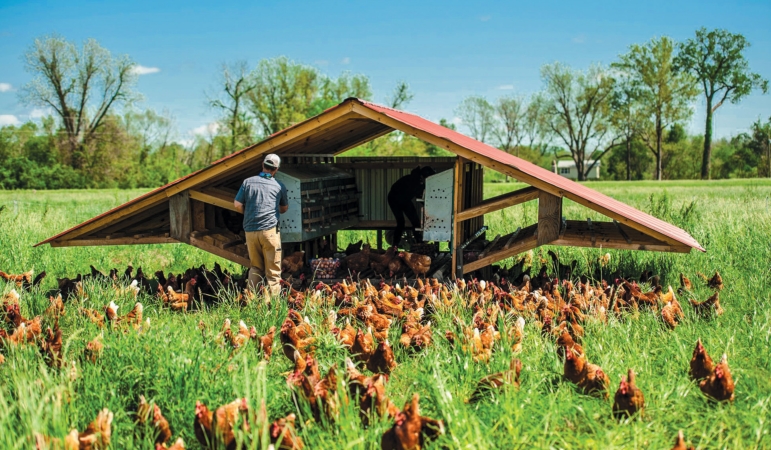
We’re kind of manipulating the cycles of nature. As we come in and graze it, we promote a new cycle of photosynthesis, promoting the carbon cycle, which in turn breaks down the dung and urine coming out of the animal.
That enhances the nutrient cycle — the mineral cycle. We’re just manipulating the cycles of nature by confining our animals into a mob and moving them across our farm.”
Sample Farm has been in the Sample family for generations, starting with Scott’s great-grandfather in 1912. But the 45-year-old never dreamed he would be working it.
“My childhood was more of a recreational childhood on the farm. We were duck hunting, deer hunting, dove hunting and riding four-wheelers.”
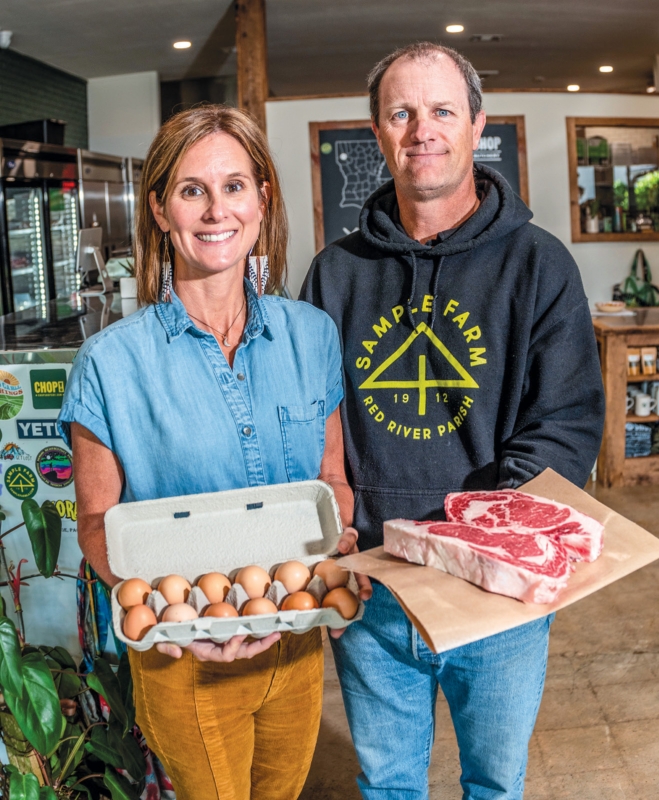
Emily and Scott Sample produce eggs and beef for sale.
But after graduating from Montana State University with a degree in soil science, Scott stayed up north, working as a carpenter in the winter and as a fly-fishing guide in the summer. Eventually, the 1998 Loyola College Prep graduate and his wife, Emily (Loyola ’99), began talking about raising a family.
“The job market was so competitive out west. I just couldn’t find a job. It was the classic saying, ‘It’s not what you know, it’s who you know.’ We just had contacts back home where I could find some work. I was at a crossroads. I had a lot of buddies up there who were fly-fishing guides, and I kind of felt like that was a selfish endeavor.”
So, the Samples moved back home where they had family. A self-described “soil science nerd,” Scott did soil remediation work in the oilfield. At the same time, he began spending time on the farm.
“I always had those college courses in my brain about that model of farming. It always intrigued me. Once we moved back here, I got 12 chickens and six heads of cattle and started hobby-farming, just because we had a farm. That morphed into friends at church who wanted eggs, and neighbors wanted some beef. Then, it just morphed into what it is today.”
Speaking of eggs, you can find some 300 chickens roaming Sample Farm. They, too, provide a healthier, tastier option to store-bought eggs.
“A pasture-raised hen has the opportunity to go out there and forge for food and grasses and bugs and worms. You see that in the color of the yolk. The eggs we produce are super-rich. The yolks are almost orange.”
But there’s more to Sample’s efforts than producing food that’s good for you.
“I also believe there is a component to our food model that has detached us from the food we eat. Food is what nourishes the body, right? I think there’s also a connection of knowing where your food comes from. I think we’ve gotten so detached from the idea of what’s on our dinner plate. Tomatoes grown in Mexico have been engineered not for nutrient content. Those things have been altered and engineered so they can take a very, very long truck ride and not bruise. We’ve just become detached from our food in general.”
To learn more about Sample Farm, you may visit samplefarmla.com.
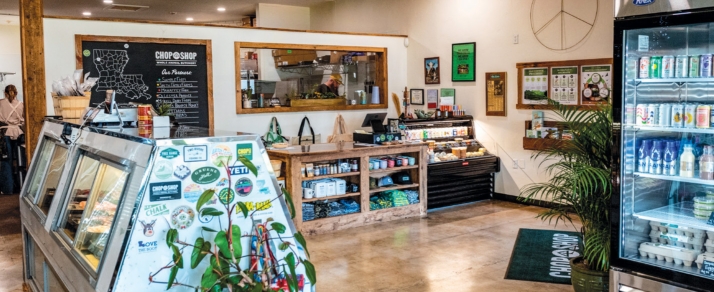 Chop Shop
Chop ShopBefore moving from the Lafayette area to Shreveport eight years ago, Kyle Baudoin knew all about Scott Sample.
“We were already buying his meat because he was a friend of a friend,” Baudoin said.
Now that Baudoin is much closer, he frequents Chop Shop three times a week.
“The hook for me was when I put the first round steak or the first ground meat into the skillet, it smelled like the meat I grew up eating. I didn’t realize I missed that until I smelled it again. There’s a different, appetizing freshness to it that you just can’t get in the grocery store.”
Chop Shop, at 724 Azalea Drive, sells locally raised beef and eggs courtesy of Sample Farm, just south of the Caddo Parish line.
“I’m a big proponent of local food production,” owner Scott Sample said. “I think we need more of it, and I think it needs to be more in the forefront of local communities.”
But Sample doesn’t limit what he sells to what he raises.
“The concept of the Chop Shop is if you’re a local farmer and you need an outlet for your product, we can be that outlet. We’re trying to walk the talk — the idea of local food production and being a community food co-op here in Shreveport is what we’re striving for.”
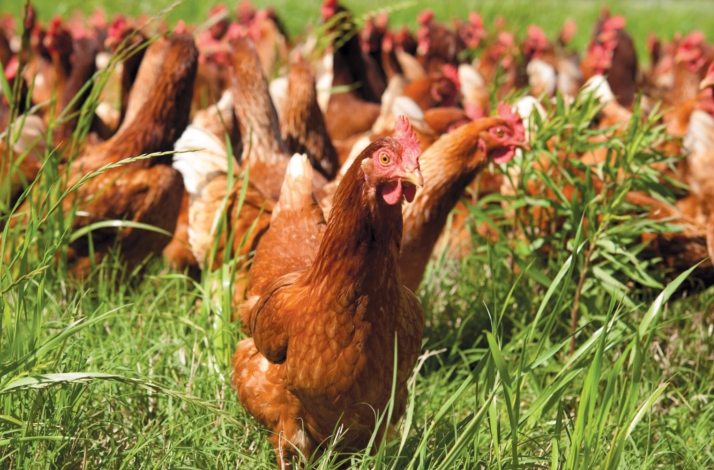
Some 300 chickens can be found roamng about Sample Farm.
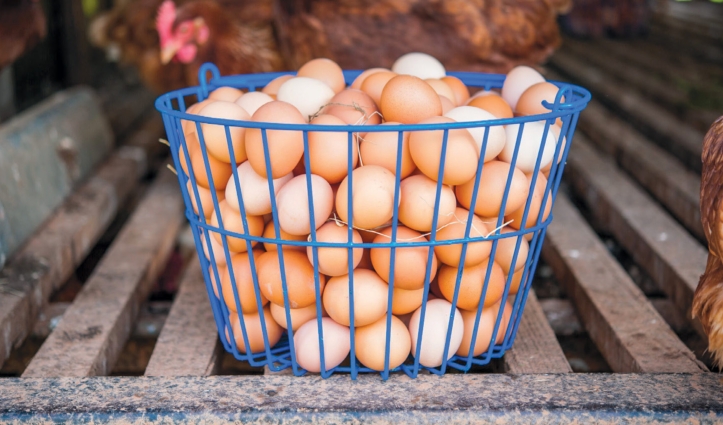
Chop Shop sells a healthier, tastier option to store-bought eggs.
As Chop Shop’s chef, Jacob Mouser sees the product up close and every day.
“As a chef, I really enjoy having this high-quality beef around. Their eggs are second to none. The yolks are orange, like cheddar cheese. You can taste the difference.”
Mouser can also taste the difference in beef.
“It’s been a fun experience tasting different parts of the cow because they all have unique tastes. … Scott’s beef makes store-bought beef taste a little sterile, like there’s no life in it. … I imagine the extra flavor that our body is picking up on is we’re tasting more minerals and vitamins and bio-available nutrients for our body.”
